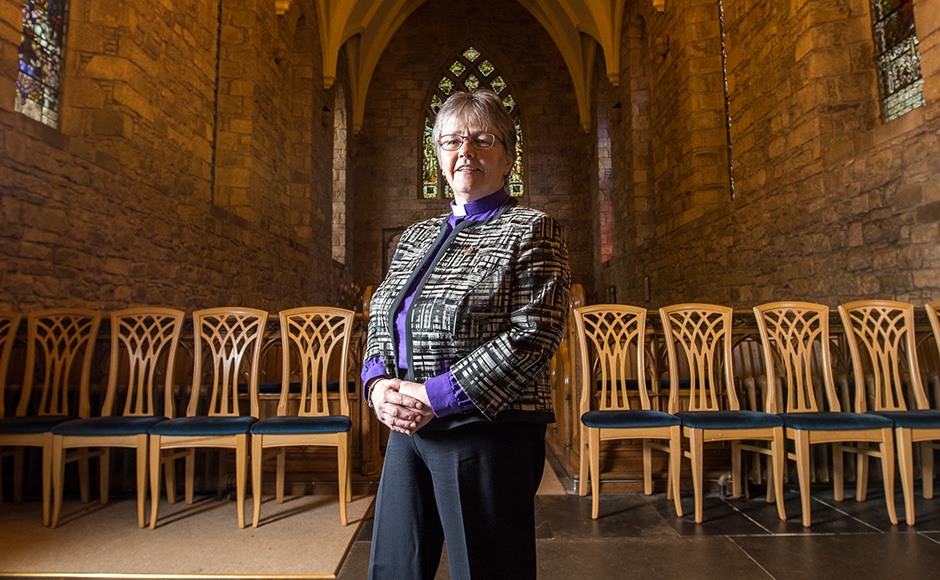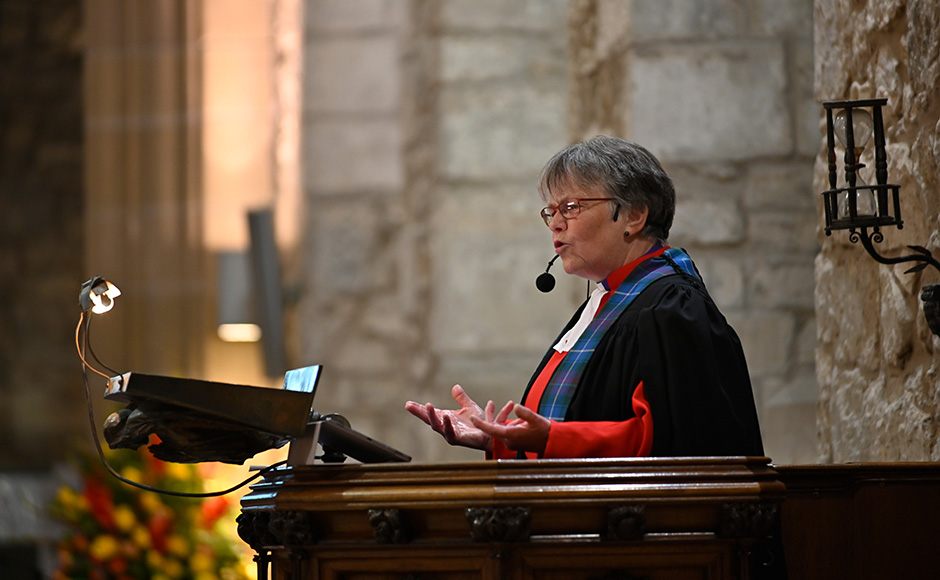July 2025: Very Rev Dr Susan Brown
The Church of Scotland's Talking Ministry monthly series shares personal stories from those serving in Christian ministry, along with resources filled with questions, prayers and reflections to help encourage reflection on how God might be calling you at this time
For July, the Very Rev Dr Susan Brown speaks about her role as a parish minister in the Highlands, her time as Moderator, and the privilege of being a Royal Chaplain.
My ministry: Very Rev Dr Susan Brown

Very Rev Dr Susan Brown was inducted into her first parish, Killearnan on the Black Isle in 1985, the first female minister in the Highlands, before becoming the first woman in Britain to lead a cathedral when she moved to Dornoch 13 years later. She was appointed Moderator of the General Assembly in 2018 and became a Royal Chaplain in 2010. Married to fellow minister Derek and mother to grown-up children Simon and Hannah, her last charge prior to retirement was at Greenlaw in the Borders.
What led you to ministry?
I actually felt a call to ministry in my mid-teens and what was really weird about that is that I didn't realise I'd never met a female minister.
I'd been brought up in the Church and was sent to Sunday school like most people of my era, but I felt there was something in this church stuff, so I just kept going, got involved in Scripture Union at school and, at 16, felt ministry was what God wanted me to do.
I had superb placements at university with people like Margaret Forrester - my first encounter with a woman minister - Ernest Sangster, John Carrie and people like that who left their mark and gave me the best of starts.
I thought I needed to do two years of probation because I was still very young and landed in St Giles' in Edinburgh - which was a completely different experience. The actual parish of St Giles' is tiny and I think I visited every part of it, but I thoroughly enjoyed the placement.
What was your first charge like?

I moved to Killearnan on the Black Isle in 1985 when women were still a novelty and not everyone particularly wanted one! It was a six-month terminable tenure appointment but I managed to stay for 13-and-a-bit years.
I suppose, in the beginning, I did feel a bit of a pioneer. The Highlands had never had a female minister and there were some who didn't approve, but in time people came around. Once you are part of a community, people don't care if you are male or female. They just want to know you are there for them. They were a fantastic congregation.
Killearnan is where I began to feel it was really important too, to be part of the wider work of the church. If you are in a little community, there is a danger that your world collapses in on itself. You have to make the effort to do things more widely to remind yourself there's more we are a part of. For me the benefits far outweighed the 5am starts and getting home at 9.30pm.
I got involved with ecumenical relations first, and that was a chance to meet other people from different traditions and to learn from what they were doing.
I was then part of the Church Without Walls report. That was a very intense couple of years of working with people across a broad spectrum of the Church. And so inspirational. The report was well received by the General Assembly. For me, it was a watershed moment that the Church should have paid more attention to. You saw faith in action with people working together, having meaningful worship together, and teasing out what it means to be a follower of Jesus in the 20th/21st century. It was a tremendous experience.
Then I went to work with World Mission, which was different again, because it meant meeting people from other parts of the world. That just opened my eyes to so much. Which is why I would say to any new minister to consider widening their horizons by engaging with Christ's family in other parts of the country, in other churches and in other parts of the world, because it is so enriching.
What did you enjoy about being in a rural parish?
I loved working in a rural parish. I love being in the heart of a community and Dornoch's strapline was 'In the heart of the community with the community at its heart'. That is really what the Church is about. More and more of our rural communities are being dismantled as schools close, doctors' surgeries move and even the Church is closing its doors, but there is a strength in rural communities that does not exist to the same extent in more urban areas. It is not an idyll, but folks still want to look out for and to know each other and have a sense of belonging that the church is able to build on.
Again, Dornoch was such a great community and I love getting stuck in with the community issues alongside the church stuff. It was just a wonderful place to be.
It was my second cathedral posting after St Giles' - I went for a hat-trick because I was then locum at St Magnus in Orkney for three months when I left Greenlaw.
Like Killearnan, Dornoch Cathedral goes back a long way, but faith and church life is about the present as well as the past and how faith speaks to current society in relevant and positive ways. When people feel isolated and worried about international events, as many do just now, the Church is perfectly placed to talk about hope and peace and justice and about love above all else.
My last call was to Berwickshire, to a wee village called Greenlaw. I was there for three years. The idea was to develop materials that would enable congregations to do their own worship. With the help of a good friend, we set up a website where scripts with all the elements of a Sunday service are posted weekly.Some congregations take the scripts and adapt them for themselves. Others are not quite so confident, while others again, have no musician to play. So, we include films and power point with and without music and people can pick and mix. Our stats tell us the materials are being used far beyond Berwickshire - or even Scotland!
This last posting was a very different set-up. But again, just being a part of a little community, as an individual and as a family and being in the thick of things, showing that God wants to be part of people's lives, is for me, so important.
What did you enjoy most about your year as Moderator?

I felt very blessed to have the privilege of representing the Church and going out to meet people to talk about what faith has to say in our land and time. The presbyteries I visited are working with the most marginalised folk in their midst and they are doing amazing things in terms of worship and service. They are regularly going more than the extra mile to help people suffering from the likes of domestic abuse, or food poverty, or people seeking asylum and they are saying without words what the love of God is all about.
We in the Church punch way above our weight in terms of caring for our neighbours and for the environment and have so much to celebrate. We need to hear more of these stories!
Away from parish life, you are also a Royal Chaplain. This must also have led to many memorable moments.
I was invited to become a Royal Chaplain to the late Queen in 2010 and when that happened again, Dornoch pulled out all the stops. They invited the Royal Chaplains to Dornoch en masse, gave them a reception, invited them for golf, took them on walks and then the whole town threw a street party after the service in the Cathedral and it was just the most amazing experience. I am so grateful to everyone involved.
After the Queen died at Balmoral, the Chapel Royal mounted a vigil all the way through until Her Majesty left Scotland. There were people with the Queen all the time she was in Holyrood House, and then all the time Her Majesty lay in state at St Giles'. It was incredibly moving to be a part of that and to see so many coming to St Giles' to pay their respects.
It was a truly historic moment.
I'm now a King's Chaplain and again it is one of those rare privileges - as is any chaplaincy; from school to cadets to whatever!
What do you think are the most important lessons about ministry?
For me, the greatest privilege in ministry is being involved in people's lives. I love leading worship, but the privilege of accompanying people through the highs and lows we all face, is just phenomenal. It's not necessarily about providing answers, it's about simply being with people and trying to live out, the living presence of the living God.
I think it's in the looking beyond ourselves that we discover where God is and how much others have to teach us. This last while, with all the changes we're facing, there's been the very real danger of the Church turning inwards. For me that can never be an option. For me, the faith journey is about travelling together with all God's people, in every time and place. If we can hold onto that bigger picture, then we will realise that our story is held in an even greater story that's not ours to write - but God's. And that could well inspire us to see and do things, differently. And with renewed enthusiasm.
The truth is, God is not done with us yet, but we need to listen and to sense where the Spirit is taking us and we need to find the courage to let others inspire and challenge us.
More information
If you would like to consider how God might be calling you to serve at this time, you may want to discuss further with your minister or be in touch with your Presbytery to explore local opportunities.
If you are interested in exploring a call to the recognised ministries of the Church, you can find more information on our vocations page and can contact ministry@churchofscotland.org.uk for a Discernment Conversation with one of the Recruitment Team.